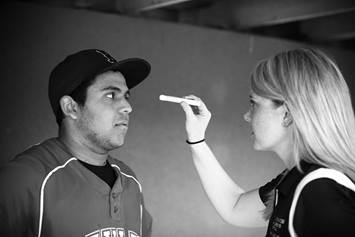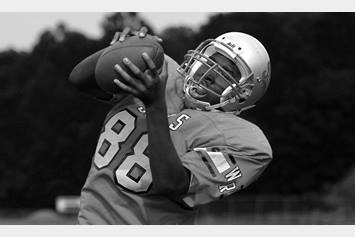Head Injury - Concussion
A concussion is a head injury. Concussion symptoms can be mild or severe.
What Is a Concussion?
A concussion is a type of head injury. It happens when the brain moves quickly inside the skull because of a bump, jolt, or hit to the head.
When a concussion happens:
- The injury to the brain is usually only for a short time (temporary).
- Your child may think, act, or feel differently for a short time.
- Watch over your child carefully for the next 4 to 8 hours.
If you think your child has a concussion, do at least one of the following:
- Call your child’s doctor or health care provider for instructions.
- Go to an urgent care clinic or emergency department.
- Schedule an appointment with the Nationwide Children’s Hospital Concussion Center.
The First 24 to 48 Hours
- Let your child rest and nap as needed during the day. They may need to stay home from school or daycare for 1 to 2 days.
- Your child needs a good night’s sleep. You don’t need to wake them up to check on them.
- Use ice packs on the head or neck to ease pain.
- If they have a minor headache within 24 hours, give them an over-the-counter (OTC) pain medicine, like acetaminophen (Tylenol®). After 24 hours, it’s also okay to give ibuprofen (Motrin®, Advil®). Read the label to know the right dose for your child.
- Avoid screens, like TV, computers, tablets, and cell phones.
- Most children go back to school in 1 to 3 days after a concussion.
- Some symptoms may not go away before they return.
- Tell school staff they had a head injury. This helps staff prepare for any changes your child may have, like issues with light, noise, behavior, focus, or memory.
- Also tell school staff about adjusting their daily school demands to help with learning.
- Schedule a follow-up appointment with your child’s doctor or health care provider. At that visit, tell them any problems your child is still having.
Signs and Symptoms
Concussion symptoms can be mild or severe. They can also come and go. They may last minutes to weeks, but they should all go away with time.
| Physical |
|
|
|
| Thinking (cognitive) |
|
|
|
| Emotional |
|
|
|
| Sleep |
|
|
|
When to Seek Emergency Help
Take your child to the closest emergency department (ED) or call their doctor or health care provider for instructions if they:
- Have repeated or extreme vomiting.
- Have numbness or tingling in the face, arms, or legs.
- Slur their speech.
- Stagger or fall while walking.
- Have hearing problems.
- Convulse or stare into space, looking dazed, twitching, or shaking (seizures).
- Have a change in behavior or personality that puts them or others at risk of harm.
- Seem to be getting worse instead of better.
- Don't wake up when you touch and talk to them.
- Have blurry or double vision.
- Are weak in an arm or leg.
- Complain of headaches getting worse that don't get better with over-the-counter pain medicine.
- Bleed from the ears or have clear fluid drain from the nose or ears.
- Have eye changes like crossed eyes, droopy eyelids, or trouble using their eyes.
- Are hard to wake up during the day or quickly fall back to sleep after waking up.
Activities Allowed
Your child can do the following activities after 1 to 2 days of rest, as long as their symptoms don’t get worse:
- Watch TV and listen to music at low volume.
- Use technology on a limited basis, like computers, video games, phones, or tablets.
- Play simple board or card games, like Go Fish or Candy Land®.
- Read, draw, and do homework for short periods of time.
- Go on walks and do other light exercise.
- Relax with friends.
You’ll know your child is better when they can do regular activities and exercise without concussion symptoms.
Activities Not Allowed
Until your child’s doctor or health care provider says it’s safe, they are not allowed to:
- Take part in gym class and active recess.
- Play contact sports and rough play.
- Do any balancing activities, like bike riding, skateboarding, or swimming.
- Drive motor vehicles like cars, ATVs, motorcycles, motor scooters, or snowmobiles.
- Do any activities that could lead to another head injury. This may worsen symptoms and slow down recovery time.
Preventing Concussions
- Passenger safety – Use car seats or booster seats for the age and size of your child.
- Sports safety – Make sure your child:
- Wears a helmet that fits well.
- Wears protective gear, like elbow and knee pads or wrist guards, when using a bike, skateboard, scooter, roller skates, or playing in a contact sport, like football.
- Learns the right way to play sports, like tackling in football or heading the ball in soccer.
- Street safety – Teach your child to play where it’s safe.
Helping Hands Patient Education Materials
Written and illustrated by medical, nursing and allied health professionals at Nationwide Children's Hospital, Helping Hand instructions are intended as a supplement to verbal instructions provided by a medical professional. The information is periodically reviewed and revised to reflect our current practice. However, Nationwide Children's Hospital is not responsible for any consequences resulting from the use or misuse of the information in the Helping Hands.
HH-I-252 • ©2005, revised 2023 • Nationwide Children's Hospital


